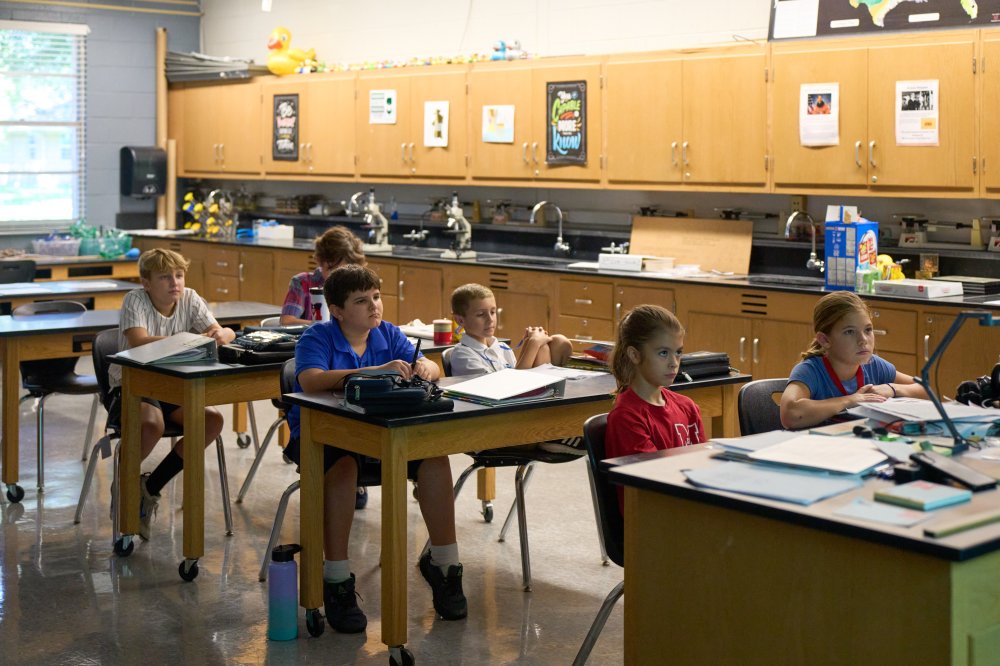-
About
- Welcome from the Head of School
- Mission & History
- Episcopal Identity
- Diversity, Equity, & Inclusion
- Facility Rentals
- Board of Trustees
- Faculty & Staff Directory
- Careers
- Contact Us
- StM News
- Admissions
-
Academics
- Academics Overview
- George Cottage
- Lower School
- Middle School
- Upper School
- Innovation + Design
- Fine Arts
- College Counseling
- Visiting Speakers, Authors, & Illustrators
-
Athletics
- Welcome from Athletic Director
-
Athletic Teams & Schedules
- Baseball
- Girls' Basketball
- Boys' Basketball
- Bowling
- Cheerleading
- Cross Country
- Football
- Golf
- Girls' Soccer
- Boys' Soccer
- Softball
- Swimming
- Volleyball
- Tennis
- Track and Field
- Facilities
- Athletic Calendar
-
Student Experience
- Student Experience Overview
- A Campus of Opportunity
- Class of 2025 Senior Spotlights
- Traditions
- Advisory Program
- Clubs & Activities
- Campus Services
- Student Support Services
- Technology
- Library
- Publications
- Tickets to StM Events
- Summer at StM
-
Giving
- Giving Online
- Why Giving Matters
- Ways to Give
- Annual Giving
- Special Events
- Planned Giving
- Legacy Societies
- Alumni
Grades 5-8
St. Martin’s Middle School offers a challenging, well-rounded curriculum that meets the intellectual, social, emotional, and spiritual needs of young adolescents.
Faculty develop students’ cognitive reasoning skills, social skills, and growth mindsets through inquiry, experimentation, and service. The Middle School curriculum encourages students to explore various sports, languages, service opportunities, and clubs as part of a well-rounded educational experience.
In addition to academic core classes of English, social studies, science, math, and world languages, courses are offered in fine arts, study skills, Innovation + Design, and religion. Design thinking projects are embedded across the curriculum. The Middle School community gathers every week for chapel services.
St. Martin’s Middle School provides robust service and experiential learning opportunities that build a fertile base of academic knowledge and interdisciplinary skills along with a growing capacity for empathy, exploration, and problem solving.
Students advance to the Upper School self-assured and prepared as a result of the lessons learned in Middle School.
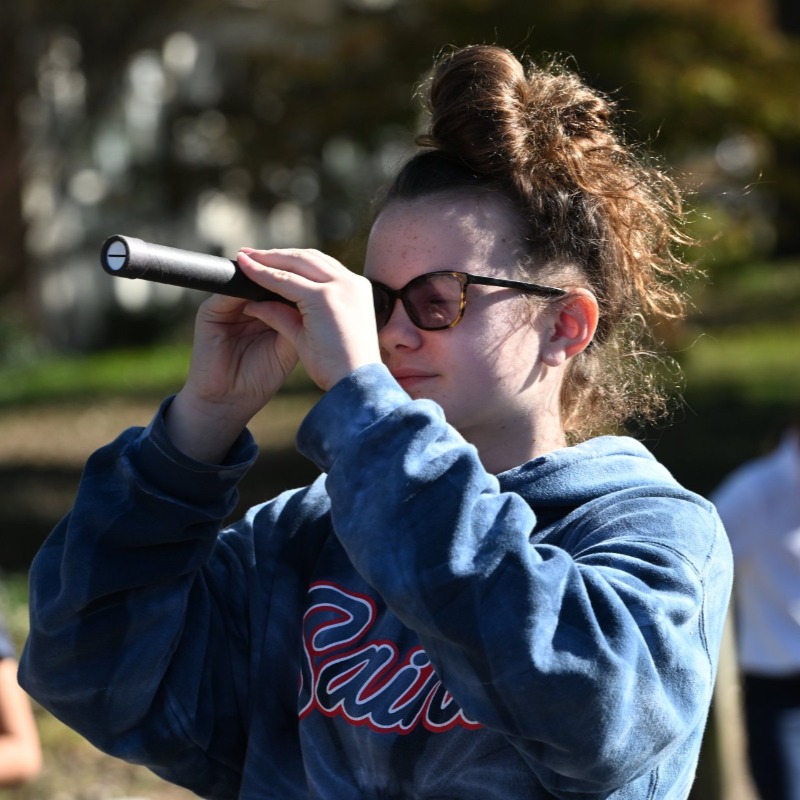
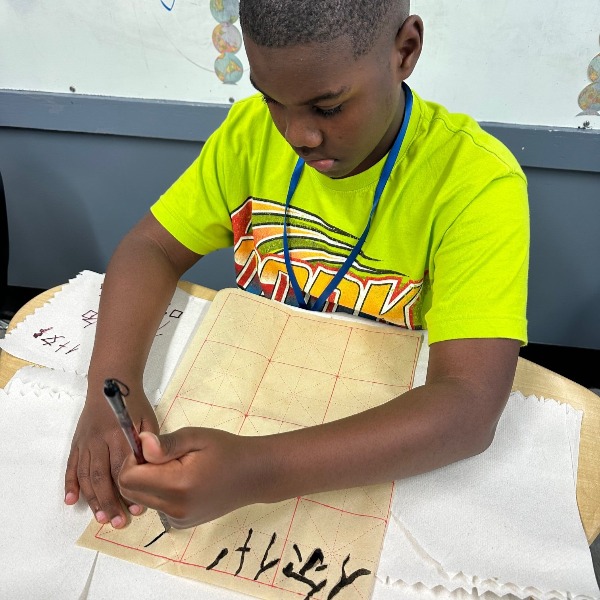
Our Curriculum
The Middle School academic program is structured to include core classes such as English, social studies, science, math, and world language, as well as courses in fine arts, study skills, and religion. The curriculum also offers a broad range of opportunities for students to explore different sports, languages, service opportunities, and clubs, enabling them to prepare for the choices available to them in the Upper School. Design thinking projects are embedded across the curriculum to encourage creative problem-solving.
English
The curriculum in fifth grade reading uses a novel-based approach. Emphasis is placed on developing critical thinking, comprehension, and fluency. There is a focus on understanding relationships between and among the characters, as well how events in the stories provided a foreshadowing of things to come. In addition to the novels, students read and discuss short stories, with an emphasis placed on comprehension and the ability to show their understanding of the reading through thought provoking questions. Independent reading is encouraged both in school and at home. Students build on the foundation laid in earlier grades to write complex sentences, and organize and develop coherent paragraphs with topic sentences and descriptive details. Students continue to write descriptive, expository, persuasive, and creative compositions. Students learn to demonstrate a working knowledge of eight parts of speech in all capacities, which gives them a foundation of language and a solid understanding of the structure of writing.
Mathematics
Using the Big Ideas Math Series curriculum, students master place value from millions to thousandths. Students increase their knowledge with the four basic math operations and apply their understanding to decimals, percents, and fractions. The students know and use metric and customary measuring units to determine length and area. They also use formulas to find the volume of simple geometric figures. Students develop fluency of the addition, subtraction, multiplication, and division of fractions and mixed numbers. Problem solving skills and practical applications are emphasized throughout the year.
Social Studies
Fifth grade social studies looks at Louisiana history, including its European roots, colonial period, and transition into statehood with a study of Louisiana's role in the broader context of American history. The course finishes with an emphasis on the history of the southern United States up to the early 21st century.
World Languages
In fifth grade, students take a six week exploratory course in Chinese, French, and Spanish, before choosing their language of study for the Middle School years. Instruction in their chosen language begins in the second semester. All languages use a Comprehensible Input approach that stresses instruction in the target language and develops confidence and competence in both oral and written skills. Chinese and French use the AIM method, which uses strategic gesturing for students to acquire vocabulary and grammar in a natural way. Activities in language courses are varied so that students have the opportunity to work individually, in partners, in small groups and as a class.
Study Skills
This course provides students with an opportunity to work on some of the most essential skills of success in an academic setting. Students focus on the use of technology including digital citizenship. Organization, presentation and executive functions are practiced as well through project based and individual experiences.
Fine Arts
Sixth grade students rotate among visual art, instrumental music, choir, and drama. Visual art classes create work in a variety of forms. Students develop skills while maintaining creativity. Instrumental music is a performance based course in which students gain an understanding of notation, technique and ensemble. The drama course introduces theatrical techniques and appreciation in a safe environment. Film studies students learn to recognize and study the art and science of media through film, television, photography and other outlets. They begin to understand the power of such visual media.
Life Skills
The innovative Life Skills curriculum is designed to help students expand their mastery of skills necessary for healthy living, assume an appropriate level of independence, and accept responsibility and consequences for their choices and behaviors. These courses give students the tools to understand issues, make decisions, and exercise social responsibility within the school and the larger community. Life Skills focuses on adolescent growth and development which concentrates on respect for self and others, confidence and self-esteem, social skills and friendships, anxiety and stress management, nutrition, prevention of bullying and discrimination, and physical and emotional changes during puberty.
English
The sixth grade curriculum includes a study of the parts of speech, basic sentence patterns, phrases, clauses and related composition mechanics. In literature, students examine the short story, poetry, novels, folklore and nonfiction. Students explore weekly vocabulary along with roots and stems. In expository writing, the emphasis is on organization and fundamental writing concepts. Sixth grade focuses on proofreading, peer editing, revising and editing.
Math
Sixth grade math reinforces fundamentals using whole numbers, fractions, decimals, ratio and proportion, percent and statistics. The course enhances critical thinking skills and logical reasoning through word problems with applications to real life experiences. Additionally pre-algebraic skills using geometry, sets, graphing, measurement, negative numbers and equations are introduced and practiced.
Science
Sixth grade students learn about earth science. Main topics include: rocks and minerals, weather, energy resources, water systems and our wetlands. Students perform many activities, such as mimicking the rock cycle with crayon shavings and tracking hurricanes, and they complete longer-term projects such as making a "rock" video and putting together a severe weather presentation and making childrens books on the wetlands.
Social Studies
Sixth graders study world geography, including physical settings, political geography, current events and environmental concerns. This class focus on developing regions of our world including Latin America and Asia. They interpret graphs and tables, read maps and globes, use the library, write, express viewpoints, and conceptualize while working individually as well as in group settings.
World Languages
In sixth grade, students continue their study of Chinese, French, or Spanish. All languages use a Comprehensible Input approach that stresses instruction in the target language and develops confidence and competence in both oral and written skills. Chinese and French use the AIM method, which uses strategic gesturing for students to acquire vocabulary and grammar in a natural way. Activities in language courses are varied so that students have the opportunity to work individually, in partners, in small groups and as a class.
Religion
The sixth grade religion classes study world religions. By comparing different belief systems students gain an awareness of others’ heritage and a tolerance for those of different faiths.
Life Skills
The innovative Life Skills curriculum is designed to help students expand their mastery of skills necessary for healthy living, assume an appropriate level of independence, and accept responsibility and consequences for their choices and behaviors. These courses give students the tools to understand issues, make decisions, and exercise social responsibility within the school and the larger community. Life Skills focuses on adolescent growth and development which concentrates on respect for self and others, confidence and self-esteem, social skills and friendships, anxiety and stress management, nutrition, prevention of bullying and discrimination, and physical and emotional changes during puberty.
Fine Arts
Sixth grade students rotate among visual art, instrumental music, choir, and drama. Visual art classes create work in a variety of forms. Students develop skills while maintaining creativity. Instrumental music is a performance based course in which students gain an understanding of notation, technique and ensemble. The drama course introduces theatrical techniques and appreciation in a safe environment. Film studies students learn to recognize and study the art and science of media through film, television, photography and other outlets. They begin to understand the power of such visual media.
English
Seventh Grade English includes a study of various literary genres, with an emphasis on fiction, drama, and poetry. Writing is both expository and creative in nature, with an introduction to multi-draft paper assignments. Two other areas of focus include grammar, with a review of sixth grade work and an introduction to verbals and clauses, and vocabulary.
Math
In seventh grade, students transition between pure computation and the abstraction of algebra, with the metric system, an introduction to algebra, the decimal system, positive and negative numbers, rational numbers, geometry, formula usage, ratio, proportion and percent, equations and inequalities and probability and statistics. An pre-algebra course is also available at this level.
Science
Seventh grade science builds on the study of the various water ecosystems started in grade 6 with an examination of salt water ecosystems. These studies build up to the annual trip to the University of Southern Mississippi Marine Education Camp and Ship Island. The remainder of the course is an introductory biology course. Units of study are the following: The Nature of Science, Cells, DNA, Genetics, Evolution and Human Body Systems with an emphasis on healthy living.
Social Studies
The focus on history spans the development of our nation, from settling of the colonies and the war for independence, through the industrial revolution and the Civil War. Students also learn about the colonial government and make connections between early forms of self-government and current government.
World Languages
In seventh grade, students may apply to take Latin in addition to a world language (Chinese, French, or Spanish). The Middle School Latin program blends a traditional concrete-sequential approach to Latin grammar with the tools and techniques of the twenty-first century classroom—collaboration, creativity, student-led activities, and cutting-edge technology. Students also actively seek evidence of Latin’s influence beyond the confines of the classroom’s four walls.
Chinese, French, and Spanish continue to use a Comprehensible Input approach that stresses instruction in the target language and develops confidence and competence in both oral and written skills. Chinese and French use the AIM method, which uses strategic gesturing for students to acquire vocabulary and grammar in a natural way. Activities in language courses are varied so that students have the opportunity to work individually, in partners, in small groups and as a class.
Religion
In 7th grade students continue to be encouraged to examine their own personal attitudes and values relating to their own spiritual growth. The seventh grade classes study New Testament history and the beginnings of the first century of the Christian Church.
Life Skills
Building on the foundation of the sixth grade curriculum, the seventh grade program is designed to encourage students to self-explore, build positive relationships, assume personal responsibility, set healthy goals, make thoughtful decisions, practice refusal skills, maintain emotional balance, and learn about the negative effects of substance abuse.
Fine Arts
Students are again given the choice of art, music, drama, or film class. They expand upon previous experiences in the course area.
English
The study of grammar in eighth grade begins with a review of writing mechanics and continues with more complex structures of verbs and clauses, emphasizing the development of more sophisticated writing. Literature embraces the study of the various literary genres: the short story, Shakespearean drama, poetry and novel. Students continue to work toward mastery of the five-paragraph essay and apply their knowledge of grammar concepts to their writing. Middle School English also includes a systematic study of vocabulary in the context of the literature selections plus continued emphasis on pleasure reading.
Math
Eighth grade mathematics is an introductory algebra class, including the metric system, properties of numbers, scientific notation, basic number concepts, operations with real numbers, equations and inequalities, problem-solving with equations, ratio, proportion and percent, polynomials, radicals, relations, functions, graphing, systems of equations and factoring. Algebra I and Honors Algebra I are available for eighth graders, offering them the opportunity to earn high school credit. Both courses emphasize the basic properties of the real-number system and applications to solving problems that can be analyzed algebraically. The course begins with operations of real numbers and solving equations and inequalities. Other areas include polynomials and their factors, rational expressions, functions and their graphs, systems of open sentences, irrational numbers and radicals and quadratics.
Science
Eighth grade science reinforces and builds on chemistry and physics concepts introduced in earlier grades. In both the regular and honors sections longer term projects show real life applications of scientific principles while teaching students how to properly conduct longer term experiments. Students are expected to apply their knowledge in new and creative ways on all forms of assessment. Units of study include, but are not limited to: Motion and Forces, Energy, Matter, Reactions, and Applications of Chemistry.
Social Studies
Eighth grade history is a survey of the ancient world up to the 16th century. This course starts with the earliest evidence of humans and continues through the European Renaissance, incorporating art, architecture, literature, science, philosophy and politics. The students utilize a number of projects and individualized learning techniques to better aid them in grasping the overarching themes of history. The year culminates with an intensive unit on the Elizabethan Age, which includes a five-page paper, presentation, and an entire day dedicated to all things Elizabethan.
World Languages
In 8th grade, students continue their study of either Chinese, French, or Spanish in addition to an optional Latin course. In Latin, students explore the fundamentals of vocabulary, grammar, reading, and translation along with key elements of Roman history and culture, including government, mythology, societal dynamics, the Roman Empire, and the spread of classical influence throughout the world. 8th grade Latin concludes with the composition and illustration of original short stories in Latin.
The 8th grade Chinese, French, and Spanish programs build upon the skills of previous years. Continuing the Comprehensible Input Method, students increase both oral and written skills through the use of gestures, literature, and increased writing activities, in preparation for High School World Languages.
Religion
In eighth grade students continue their examination of the bible as they study the Old Testament prehistory stories and the patriarchal families.
Life Skills
In eighth grade, students gain a deeper understanding of personal and social responsibility, healthy relationships, effective communication, cyber-bullying, peer and societal pressures, decision-making, goal-setting, problem solving, conflict resolution, emotional regulation, substance abuse prevention, and suicide prevention.
Fine Arts
In 8th grade students continue their development in one of the four offered courses: visual arts, instrumental music, theatre, or film.
Middle School News
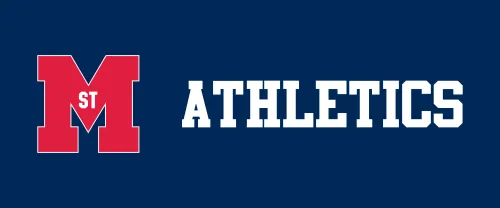 May22St. Martin’s Partners with Ochsner Performance Training to Launch New Summer Program for Student-Athletes
This summer, St. Martin...See Details
May22St. Martin’s Partners with Ochsner Performance Training to Launch New Summer Program for Student-Athletes
This summer, St. Martin...See Details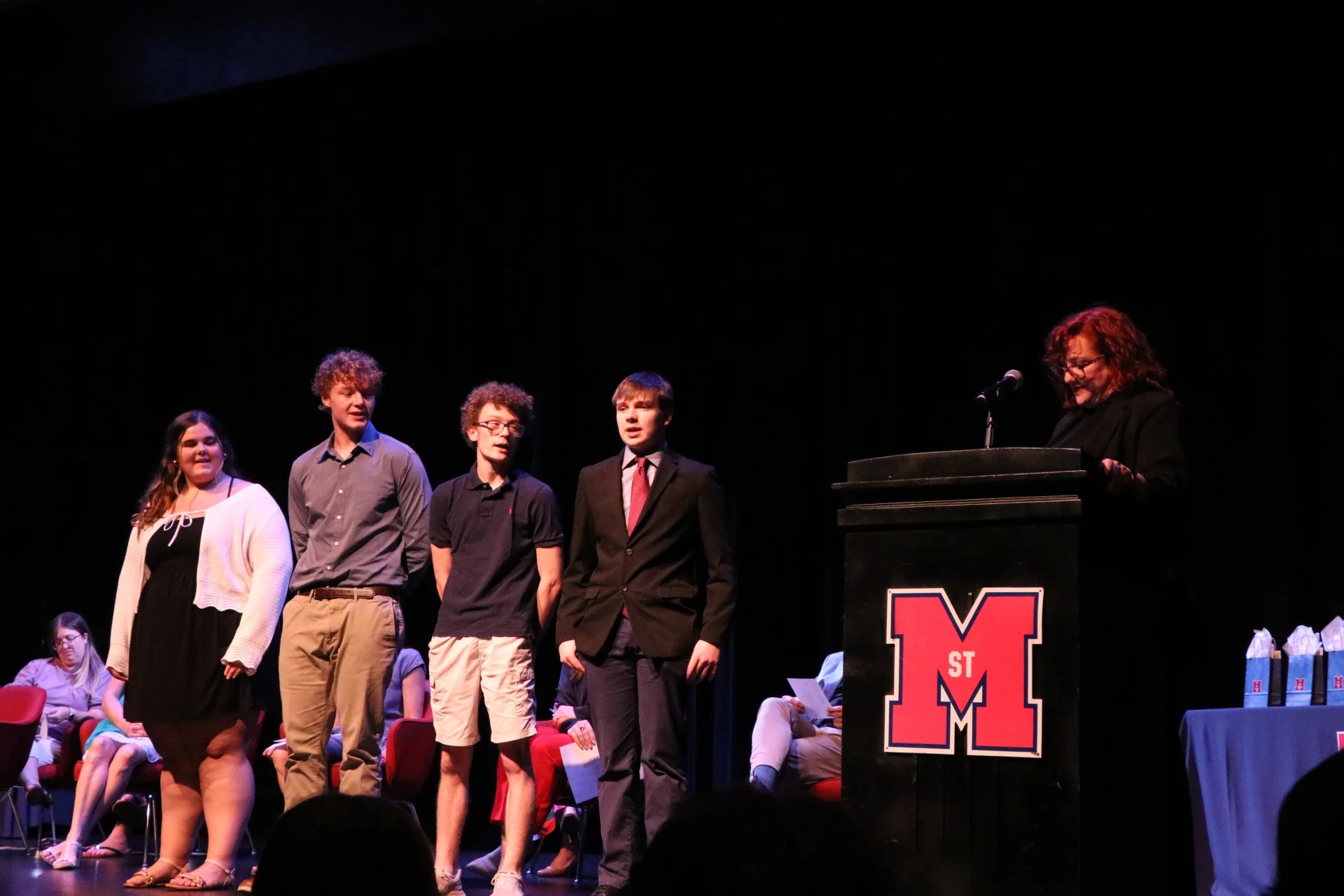 May12Marti Awards Celebrate Performing Arts Students
The St. Martin’s Perf...See Details
May12Marti Awards Celebrate Performing Arts Students
The St. Martin’s Perf...See Details May12Sixth Grade Constructs Benches in I+D Class
Our Sixth Graders have ...See Details
May12Sixth Grade Constructs Benches in I+D Class
Our Sixth Graders have ...See Details
Visit St. Martin’s
Apply to St. Martin’s
